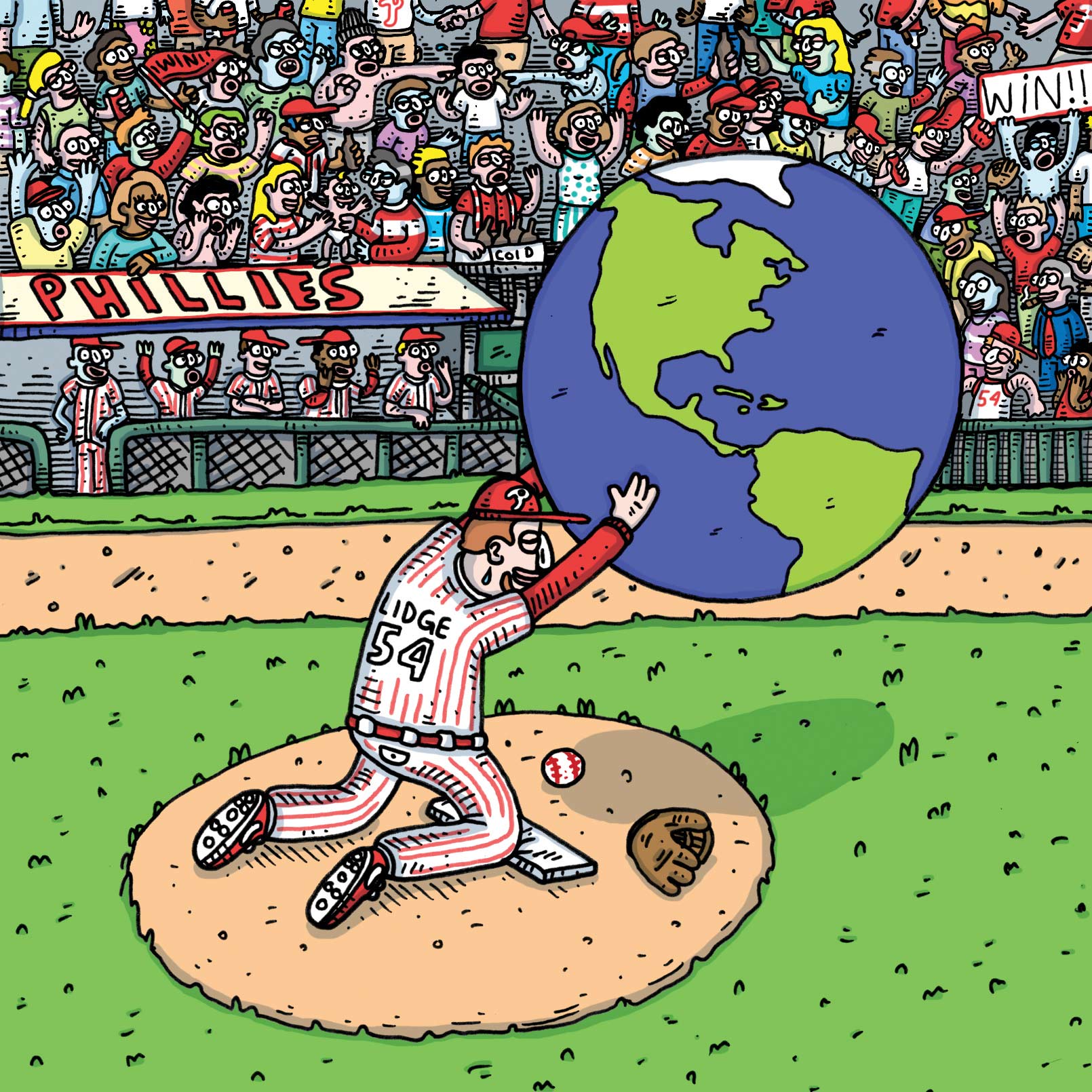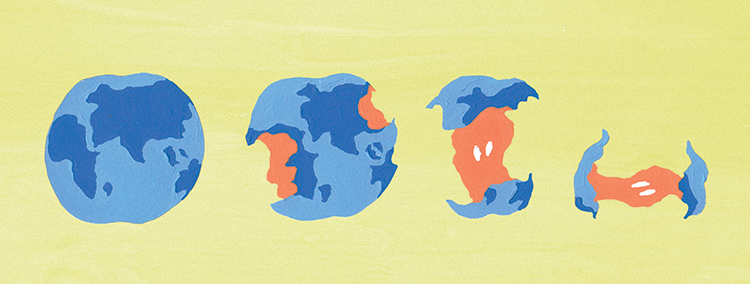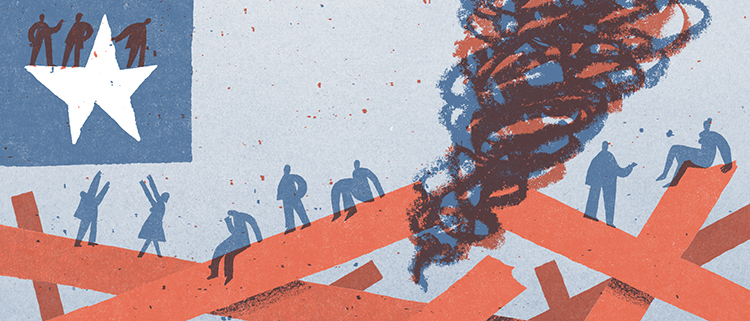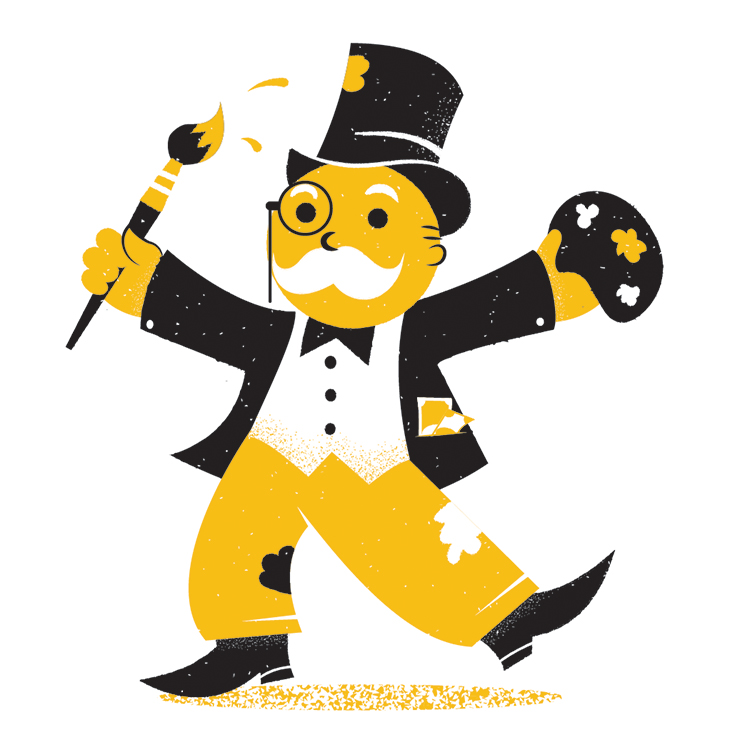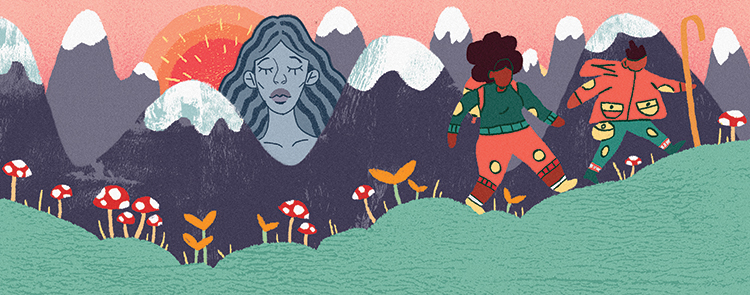Illustration by Sam Cardelfe
The Pitch
interview by Alex Mulcahy
There’s more to life than baseball, but it didn’t feel that way on the night of Oct. 29, 2008, when Brad Lidge let loose the pitch that made the Philadelphia Phillies World Series champions, delighting the city and rewarding an ecstatic fan base. However, just four years after his perfect season, Lidge’s baseball career was over. He and his family moved back to Colorado, where he had grown up, and he went back to school and earned a postgraduate degree in archaeology from the University of Leicester in England, a significant departure from his bachelor’s degree in religious studies. Part of the coursework was working at an excavation site in Italy.
In addition to pursuing a new academic path, Lidge also reconnected with an old friend, Aaron William Perry, with whom he had played in baseball and football leagues as a kid. While Lidge had been a Major League Baseball player, Perry had started and run two sustainability-related businesses, one in oil-recycling and the other in natural and local food delivery. Perry realized that his experiences, coupled with his own academic pursuits, were giving him fodder for a sustainability-themed book.
“Y On Earth: Get Smarter, Feel Better and Heal the Planet,” which will be released in early 2017, is a book Perry hopes will encapsulate his life’s learning so far. The “Y” is for millennials—Perry has a teenage son and daughter—and he wants the book to serve as a guiding light for Generation Y. The ambitions of the book are wide and far-reaching, and it’s being presented as “a quest exploring our connection with Earth, soil, food and each other, in order to cultivate a culture of love, care and a spirituality of grounded optimism, stewardship, humor and humility.” Lidge is helping to promote the book, offering signed baseballs and other collateral as rewards for people who pledged money to the book’s Kickstarter campaign. When the book is released, both Perry and Lidge plan to promote it here in Philadelphia.
Do you feel like your archaeology studies have informed your views on sustainability or humanity as a species?
BL: Yes, and I think just as much from the ancient history perspective. When I was going over to Italy and staying in a small town there—you know, Italy is the hub and the originator of the Slow Food movement. They’re still making their pasta, and making their dinners, taking a long time to do it, and it really becomes a communal thing. It changed my perspective. You look out at the fields that they have there, and you realize for thousands of years they’d be growing these olives and these grapes and harvesting the way they have, and nothing has really changed there. There’s something that really feels kind of fulfilling when you’re going through the same process of eating the same food that you’re studying about—that the ancient Romans did 2,000 years prior to me being there.
I think it speaks to an urge to rediscover continuity.
AWP: That whole notion of really understanding ourselves and our generation in the context of the broader human story I think is one of the really important messages that we speak to in the book.
We have a tendency to think that whatever we have seen in our lives is normal, and it’s easy to forget about how different things were even relatively recently.
AWP: One of the things that just popped in my head is a little slogan—consumerism is a fad. And it’s a fad crossing a couple generations here, but I wouldn’t be surprised if it didn’t really change quite a lot over the course of the next couple generations. I remember beginning to learn about things like permaculture and things like taking good care of the soil, and learning also that, meanwhile, “mainstream” practices in agriculture were really kind of a carryover from the normalization of the industrial-chemical machine that was part of defeating fascism in World War II.
Things have changed so much [over generations], we couldn’t really see how different our current situation is and was a couple of generations prior. And when I was talking to my grandfather, who actually was a prisoner of war in World War II, about things like gardening and the importance of growing your own food, he was the one who said, “Yeah, that’s normal. Growing your own food, having your own garden, that is the normal pattern.”
Brad, I’m always shocked at how much anger and hostility there is out there when athletes make a political stand. Even though the message of the book is, “Hey, this isn’t political. This is dirt, this is air, this is water, this is humanity, this is not political,” it will be construed that way by some. Do you worry about the possibility of blowback from lending your celebrity to a cause?
BL: I think you get to a point in life where you have to go for it with things and different ventures that maybe come up in your life that you really actually believe in. I’ve known Aaron for a long time, and I completely believe in what he’s doing. I’ve listened to him talk over the last few years about this stuff, and he’s so committed to it. This is something that I really believe in, and I’d like to be able to help out in any way possible. So, it’s definitely true, there’s always the people who will jump on Twitter, or whatever, and kind of bash things, and interpret things incorrectly. But like I said, you get to a certain point in life and I think that [you stand up] for what you believe in.
What role does religion and spirituality play in this?
BL: I was raised Catholic as Aaron was, and I guess my religious views would compel me to act on this more than people might understand. If you don’t dwell on these issues, or if you don’t think about it, it becomes not necessarily integral with your religious beliefs a lot of times. But for me it is. For me it is integral with my religious beliefs and how I perceive God and everything else, because [we are] stewards of the earth, stewards of life. It doesn’t have to be a religious thing, but for me it does align with what I believe—being a steward of the earth and taking care of this earth—and handing down those thoughts to my children so that they can do that with their children.
AWP: It’s not that this is a religious project, per se—it’s really not. But we as humans, we have an opportunity to pause and reflect a bit on our spiritual orientation and our sense of being stewards on this planet, this just amazing creation.
I was struck that for a lot of us that might identify more directly as having a faith-based orientation of the world—there’s been almost like a big rift between a lot of those friends and family of mine and notions of environmental stewardship, and we’re actually seeing that really, really shift right now.
I think it’s in part [due]… in particular [to] the leadership of Pope Francis around his very emphatic call to humanity to embrace our lives as stewards, and to embrace being compassionate for our fellow human beings, and connecting the dots between macro changes to our climate and impacts to the forests and the coral life.
[Pope Francis] speaks to—one out of eight people on the planet [who] identify as Catholic. Three out of eight identify as Christian. When we start to dig into the texts a little bit, we find [the Book of] Genesis—the creation story that Jews, Muslims and Christians identify with, representing over half the global population. And I think there’s just so much wisdom and knowledge that can be gleaned from some of these ancient texts, and the same is going to be true over in the Sanskrit and Vedic texts that we would find in Asia.
That may not be the entry point or the trailhead for everybody to get engaged with these topics that we’re
exploring and sharing with folks, but I think it’s, a really important one to further connect dots that probably haven’t been very well connected in our culture.
BL: There are threads that are common and unite every religion—whether the Eastern philosophy of, “Do not do harm to others” or Western philosophy of, “Do unto others,”—there is that thread of taking care of humanity. And for me, I see more clearly now every day how being a steward of this earth is taking care of your fellow human. So for me, it becomes almost imperative in terms of my religious beliefs.
Aaron William Perry is a social entrepreneur and author who lives in Boulder, Colorado. Brad Lidge, who also lives in Boulder, is a budding archaeologist and an all-time Phillies great.



